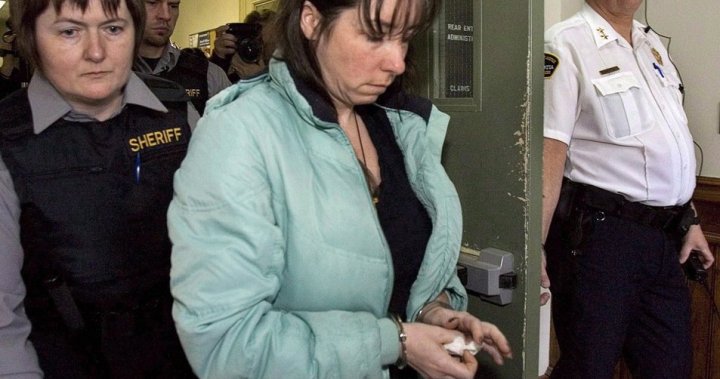In a decision that has reignited painful memories across Nova Scotia, Penny Boudreau—the Bridgewater woman who strangled her 12-year-old daughter Karissa in 2008—has been granted unescorted temporary absences from prison. The Parole Board of Canada confirmed Thursday that Boudreau will be permitted to leave the institution for community service work as part of her gradual reintegration process, despite serving a life sentence for one of the region’s most shocking crimes.
The case that horrified Canadians began on January 27, 2008, when Boudreau reported her daughter missing, launching an extensive community search effort. For weeks, she maintained a public facade of a desperate mother, even appearing at press conferences pleading for her daughter’s return. The truth, however, was far more sinister. Boudreau had driven Karissa to a remote area, strangled her with twine, and discarded her body along the banks of the LaHave River in Bridgewater.
Court records revealed the disturbing motivation behind the murder. Boudreau’s boyfriend, Vernon Macumber, had delivered an ultimatum—it was either him or her daughter. Rather than ending the relationship, Boudreau chose to eliminate what she perceived as an obstacle to her romantic life.
“This case represents one of the most profound betrayals of trust imaginable,” said Dr. Emily Richardson, forensic psychologist and consultant on child protection cases. “The person who should have been Karissa’s primary protector became her killer.”
Boudreau eventually confessed to the crime and in January 2009 was sentenced to life in prison with no possibility of parole for 20 years. The sentencing judge called the murder “despicable,” noting that Boudreau had exploited her position as a mother in the most extreme way possible.
The Parole Board’s decision comes after Boudreau has served approximately 15 years of her sentence. While she remains ineligible for full parole until 2029, the temporary absences represent a significant step in her correctional plan. According to the board’s statement, Boudreau has “demonstrated progress in addressing risk factors” during her incarceration.
Community reaction in Bridgewater has been predominantly negative. “Some wounds never fully heal,” said longtime resident Margaret Thorpe. “Every time her name appears in the news, it brings back the horror of what happened to that poor child.”
Victims’ advocacy groups have also expressed concern about the decision. “When someone commits such a calculated act against their own child, it raises serious questions about rehabilitation,” noted James Donovan from Victims’ Rights Canada. “The system must balance rehabilitation with the enduring impact on communities and extended families.”
The Correctional Service of Canada has emphasized that unescorted temporary absences are carefully structured and monitored. “These programs are designed to test an offender’s readiness for eventual reintegration,” explained correctional spokesperson Catherine Mills. “They begin with highly restricted movements and gradually increase privileges based on consistent compliance and behavioral assessments.”
Karissa’s father, who has maintained privacy throughout the years following his daughter’s murder, declined comment through a family representative.
The case continues to resonate in Canadian criminal justice discussions as an example of filicide—the killing of one’s own child—which remains one of the most psychologically complex and disturbing categories of homicide. Mental health professionals note that such cases often involve a distorted perception of the parent-child relationship and extreme narcissistic tendencies.
As Boudreau begins these supervised community visits, many questions remain about the efficacy of rehabilitation in cases of such extreme betrayal of parental duty. What does justice truly look like when a mother takes the life of her child, and can society ever fully reconcile the competing goals of punishment, rehabilitation, and public safety?


















